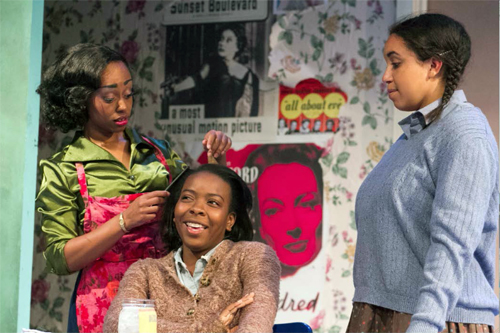
By Eric George Tauber

SAN DIEGO — At the end of the day, who are we? Are we defined by our past? By our hopes for the future? Or by the ideals we strive to live by? These are the questions raised in Crumbs from the Table of Joy playing at the Moxie Theatre through March 2nd.
We begin in a train station in 1950. Godfrey Crump is a man broken by grief and guilt after the death of his wife, Sandra. To give his two daughters a better future, he takes them out of the Jim Crow south up to Harlem.
The story is told through Ernestina, his elder daughter. She is articulate, creative and smart. In fact, she will be the first member of the family ever to graduate from high school. We slip in and out of Ernie’s fantasies so fluidly it can be hard to tell when they’ve begun. But life is like that in a creative mind.
Once they get settled, Aunt Lilly shows up. But she’s not just visiting. She’s moving in. Their Nana doesn’t think it’s appropriate for a man to live alone with two girls “once they’ve sprouted bosoms.” She has sass, style and a loud, cackling laugh. No longer the country girl, Lilly is a Harlem sophisticate, “the only colored woman who dresses like a white lady.” It is her own personal act of subversion to look better than they do.
Plus, she’s a communist. The pot gets pretty stirred up when the newspaper, “The Colored Worker” seems to advocate communism. In the age of McCarthy, “Red” colored folks are the greatest threat of all.
The chemistry between Lilly and Godfrey is palpable. They have a history. Godfrey is a man torn. Lilly wants him to be the smooth talking, hard-drinking love rboy he used to be. But Godfrey is now a disciple of “Father Divine.” He wants to live by the “3 Vs: Victory, Virtue and Virginity”. It is a life free of vice, abstaining from alcohol, tobacco, gambling and sex … even in marriage. Godfrey has many questions and he believes that only Father Divine has the answers.
During the Great Depression, thousands of hungry souls were fed at Father Divine’s “Peace Missions” where they heard a gospel of racial equality. A shrewd businessman, his ministry owned hotels and farms where many of his followers found work. Like that of the Rebbe Menachem Mendel Schneerson in the homes of Chabadniks, his portrait was hung in the homes of his disciples and Godfrey tips his hat to the “Sweet Father” every day as he leaves for work.
Enter Gerte, a recent immigrant from Germany. Alone, hungry and scared, she and Godfrey meet on the subway … and hastily marry. Blending families is always a volatile alchemy. But an interracial marriage in 1950? … Oy vey.
Jennifer Eve Thorn’s Gerte kept our gears turning. Coming from a war-torn land, her white skin hasn’t granted her an easy life. A young German so soon after the war raises questions about her part in it. She doesn’t seem to have a racist bone in her body. … But you never know. Many people did things they later regretted.
I last saw Vimel Sephus in The Elaborate Entrance of Chad Deity at Ion. It was a fun role, but not a deep one. As Godfrey, he reached the depths of a deeply conflicted man and showed us what he’s made of. I was likewise surprised by Cashae Monya. In Bluest Eye, I thought she was a juvenile as she portrayed. But she quickly grew up into a headstrong, sassy, sexy woman that was fun to watch.
Director Delicia Turner Sonnenberg found the two daughters, played by Jada Temple and Deja Fields through the School for the Creative and Performing Arts. Poised and confident, Jada took in the audience like a master storyteller and Deja’s boisterous and colorful personality kept us very entertained.
In all, Crumbs is a touching story, rich in heart and soul. If your spirit is hungry, then come dine at the Moxie. Crumbs from the Table of Joy is a feast you won’t soon forget.
*
Eric George Tauber is a freelance writer specializing in the arts. He may be contacted via eric.tauber@sdjewishworld.com